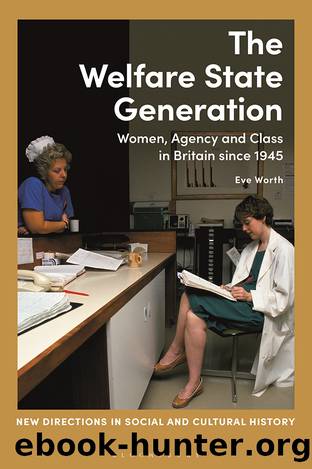The Welfare State Generation by Eve Worth

Author:Eve Worth [Worth, Eve]
Language: eng
Format: epub
Tags: History, General, Europe, Great Britain, Social History, Modern, 20th Century, 21st Century, Women
ISBN: 9781350192089
Google: mTBREAAAQBAJ
Publisher: Bloomsbury Publishing
Published: 2021-12-16T03:11:15+00:00
Autonomy
The impact of large public sector reorganizations and the introduction of new layers of management filtered down to the regulation of the day-to-day activities of women working in the welfare state: political change was experienced on a personal level. Paradoxically, therefore, although Thatcherite rhetoric was framed around freedom from state intervention, successive Conservative governmentsâ dislike of an expansive welfare state meant that, in practice, many women experienced a steep increase in intervention from the late 1980s onwards. Land argued that, during this period, it was âof particular significance to womenâ that âthose involved in the production of the social wage [had] a weaker voiceâ.102 The pioneering Labour minister Barbara Castle had defined the âsocial wageâ in 1981 as âthe standard of publicly provided services which mean so much to famil[ies]- health, education, housing and a good environmentâ.103 This loss of autonomy was fundamental to the process of de-professionalization and made it harder for women to make the kinds of politicized intervention through welfare roles outlined in the previous chapter. Women of this generation described this in detail in their interviews because they had often worked in the welfare state before, during and (sometimes) after the policy shifts.
Some women, who had divorced and were now single or married to new partners, experienced positive moments in their personal lives during this decade. This feeling of more agency in their personal lives could contrast with increasing loss of autonomy in the workplace. After marrying young, many women of this generation indicated that they felt happier living on their own or found their new relationships more compatible than their first marriages. India (b.1947) and Clara (b.1939) both emphasized that they knew themselves a little better by early middle age and felt more relaxed in their second marriages. Theresa (b.1941) and Jacqui (b.1943) were relieved to be separated from the husbands; they had long thought it had been a mistake to marry. After her divorce, and with a young daughter, Jacqui made the decision to leave social work because it was becoming very stressful and took an entry-level position at a publishing house.104 She described âmissing the sense of professional self terriblyâ and occasionally decided to put an application in for a social work role but ultimately resolved that âit was all retrograde, there was no way it was going to workâ.105
Women articulated that having a degree of freedom to exercise their own judgement in their work was very important to them. They believed that there had previously been faith in their ability, and they were often left alone to carry out their duties. Jean expressed these sentiments about her nursing role during the 1970s: âWhen I was a district nurse back before I had my children, youâd use your common sense you know â you went in to see somebody, and youâd decide well do they really need a bath or did they need breakfast? Youâd use your skills and make a decision.â106 Women employed in other welfare professions shared similar experiences. Rita described her time in an early academic job: âI could do things and I could really make a difference.
Download
This site does not store any files on its server. We only index and link to content provided by other sites. Please contact the content providers to delete copyright contents if any and email us, we'll remove relevant links or contents immediately.
| Civilization & Culture | Expeditions & Discoveries |
| Jewish | Maritime History & Piracy |
| Religious | Slavery & Emancipation |
| Women in History |
Cecilia; Or, Memoirs of an Heiress — Volume 1 by Fanny Burney(31333)
Cecilia; Or, Memoirs of an Heiress — Volume 3 by Fanny Burney(30934)
Cecilia; Or, Memoirs of an Heiress — Volume 2 by Fanny Burney(30889)
The Secret History by Donna Tartt(16623)
Sapiens: A Brief History of Humankind by Yuval Noah Harari(13053)
Leonardo da Vinci by Walter Isaacson(11903)
The Radium Girls by Kate Moore(10907)
Sapiens by Yuval Noah Harari(4537)
The Wind in My Hair by Masih Alinejad(4424)
How Democracies Die by Steven Levitsky & Daniel Ziblatt(4399)
Homo Deus: A Brief History of Tomorrow by Yuval Noah Harari(4279)
Endurance: Shackleton's Incredible Voyage by Alfred Lansing(3844)
The Silk Roads by Peter Frankopan(3760)
Man's Search for Meaning by Viktor Frankl(3634)
Millionaire: The Philanderer, Gambler, and Duelist Who Invented Modern Finance by Janet Gleeson(3569)
The Rape of Nanking by Iris Chang(3516)
Hitler in Los Angeles by Steven J. Ross(3437)
The Motorcycle Diaries by Ernesto Che Guevara(3332)
Joan of Arc by Mary Gordon(3258)
